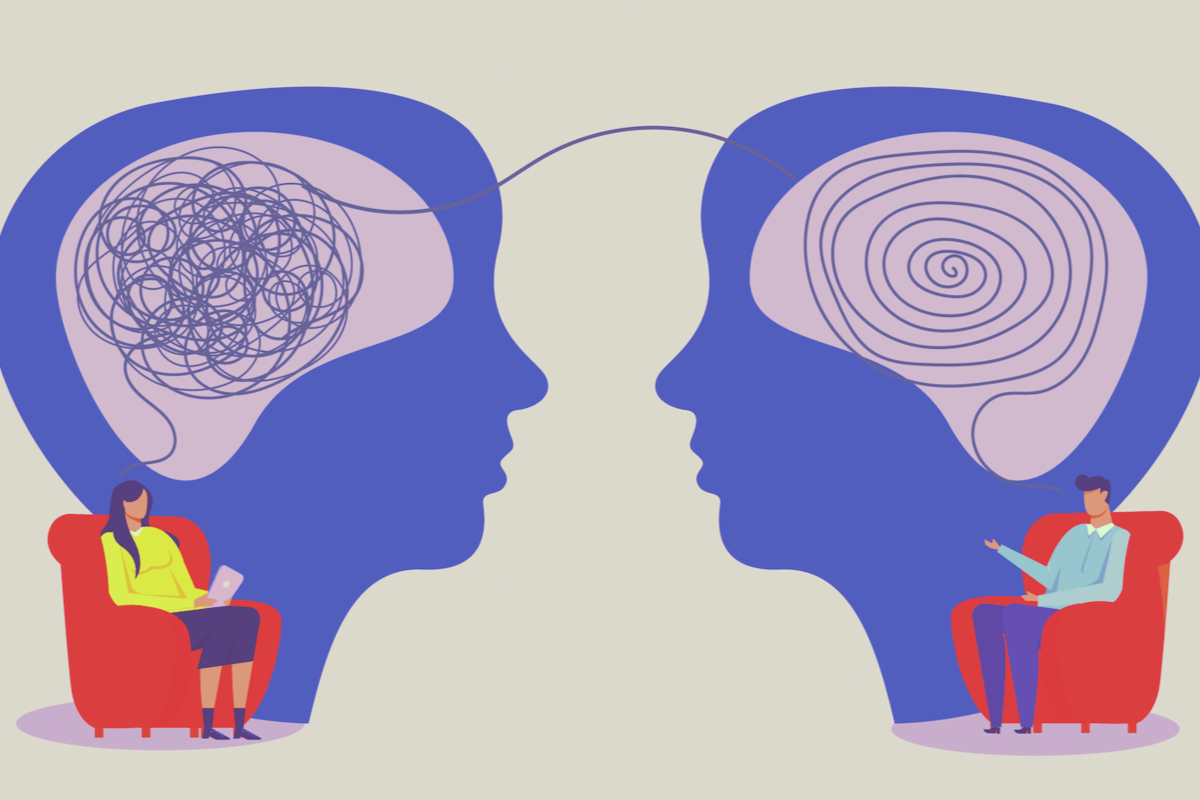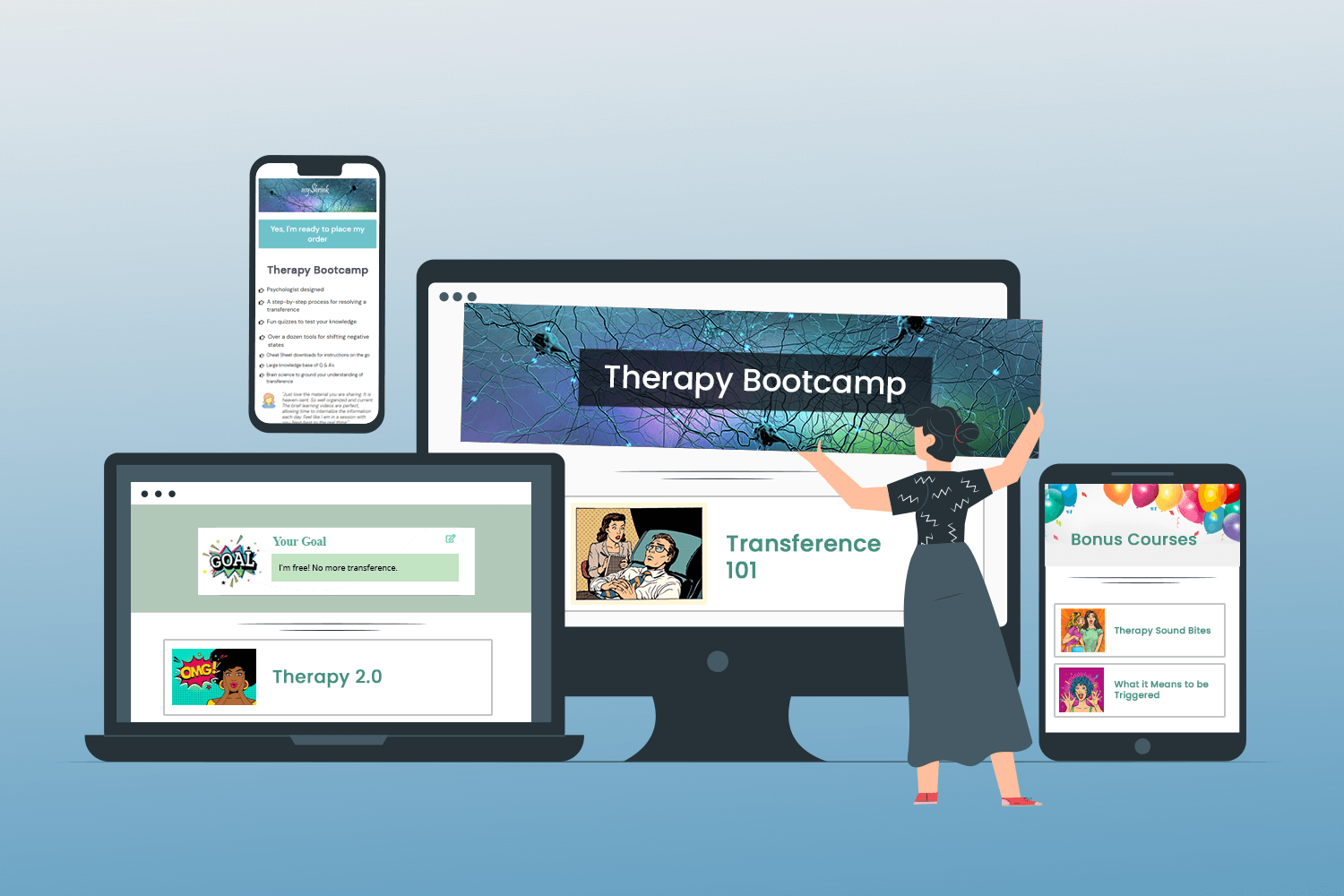

"I'm in love with my therapist"
No matter whether you're in love with your therapist or whether your therapist feels like the Mom or Dad you never had . . . wouldn't you agree . . . the feelings are intoxicating.
It's never enough. A moment here, a moment there just to cocoon into your favorite fantasy.
You know you should stop but it's just too good to feel.

It's a delicious secret. You love the special feeling.

At the same time, you can't escape the feeling of being embarrassed.
You realize this can't continue. The feelings feel so real you wonder "why can't they be real?"
You worry and dread the time when the fantasy will end.

Psychologist / Therapeutic Guide, Dr. Susan LaCombe
You're welcome to read this sample post from my online program called Therapy Bootcamp.
Therapy Bootcamp is a consumer's guide to transference.
By the time members get to this post, they've had lots of practice using the tools I mention.
(The section describing the step by step process for eliminating the obsession of being in love with your therapist is missing from this post. You can read a brief outline below.)
It sounds as if Hannah has a good connection with her therapist. Will she get the experiences she needs to resolve her transference? She seems committed to doing so. Will it be enough?

Hannah, Michigan, USA
I'm a lesbian in love with my older female therapist.
I am married to my partner of 11 years and very much in love with her. I have been very concerned with my feelings that I have had towards my Psychiatrist (also female, but much older).
I have serious issues with talking to people about my personal 'stuff' so seeing a Dr. was a difficult choice to make for me. My first 10 sessions were very very quiet on my part. But yet after my 4th session I realized that I had significant sexual feelings towards her and started to research her on the net, finding out such personal things as her home address (which I have driven by).
I feel like a stalker and my partner is also becoming concerned with how interested I am in the Dr's life! I'm afraid to tell her (Dr.) how I feel because like everyone else, the thought of the rejection is horrifying. By the way, she has diagnosed me with an Anxiety Disorder with Panic Attacks.
I really noticed that I had deep feelings for her when she had suggested that our sessions end until I felt I was able to participate in the Talk Therapy she was offering me. I freaked and started to cry (the first time I showed any emotion in an appointment). I told her that we couldn't end the sessions because I wasn't ready and I didn't think that I could handle not coming, then explained how stressed I was when our appointments were cancelled over Christmas.
She decided to continue the sessions as I had made a breakthrough at that point. I should have said something at that point but didn't understand the feelings myself, let alone have to explain them to her.
I googled 'being in Love with your therapist' and came upon the word 'transference', I've now realized, after reading your site and others, that I am normal (so to speak). I think that because I had a very poor connection with my mother as a child/young adult (before she died) that I am possibly confusing sexual feelings with that of wishing she were my mother because of the compassion she shows, and her ability to make me feel like she cares.
Anyway, thanks for having such a great site, it's motivated me to talk to her about transference, if I can manage to get it out of me.
Hannah (Manitoba, Canada)

Shrinklady
Hannah, thanks for sharing your story with us. Transference is often a good sign that there's enough of a connection with your therapist. So I'm glad to hear you're on this journey of healing.
At the outset though, you may need a little more safety in order to progress through your work. That you're not speaking very much in your sessions suggests you're probably flooded. (Incidentally, you can become safer through your own efforts if your therapist is unfamiliar with how to do this. But that's another subject.)
It was disappointing to hear that your therapist suggested ending your work because you weren't saying enough. I imagine how troubling that would have been (the younger parts of you probably felt abandoned). I can easily see why your therapist might get tripped on this though . . . truthfully, I know the potential for triggering abandonment in my clients only because I've worked through some of my own abandonment issues.)
When I read your post I was reminded of my own experience as a client many years ago. I would sit there, session upon session, saying very little. She was kind enough towards me, but now I know that being a "nice" therapist isn't the stuff that makes for good therapy.
We've learned from neuroscience that it's essential for our emotional brain to have safety. Other than to gently ask me questions, my therapist never talked about the need to reduce my fears or find ways to help me feel safe in the sessions.
Today, I now realize that I was confusing the relief I felt after each session, as progress. Truthfully, I barely moved the needle of any real change even after nine months of weekly therapy.
Even though your therapist hasn't introduced any techniques to promote more safety, it's important that she be emotionally attuned and engaged in the present moment throughout the session. She must be emotionally available to you. (This will to a great extent be dependent on the health of her nervous system and her emotional/spiritual fitness.)
With her help in managing these intense moments your nervous system will learn to do this on your own. It will learn to self-regulate. (Albeit, there are ways to speed this process up.)
From what you're saying Hannah, she does seem to be somewhat emotionally available. After all she agreed to keep seeing you. (Though the fact that she missed sensing your attachment suggests therapy with her may be long drawn out—in my view, needlessly).
Nonetheless, if you can manage to reduce your fear, then I believe your therapy will open up to other possibilities.
As you feel safer, you'll likely move on to experience and disclose your feelings in the session, and give your therapist the chance to help you gently move through them.
If you can't embrace the therapy approach - particularly when the presenting problem is around self-expression - then the "working through" for you might entail working directly with what blocks you from sensing into the energy of her words. This is where working with that part of the brain - the lizard brain - comes in handy.
BTW, it's my opinion that therapists who get faster results teach folks to "ground" themselves through the body and/or to resource themselves by recalling pleasant experiences (i.e. using body psychotherapy techniques such as focusing). They make the task of grounding an explicit, concrete part of the therapeutic work.
If you find these thoughts worthwhile, you might think about opening up a dialogue for further discussion with your therapist – I suspect it just might lead to a new line of therapeutic encounters.
All the best,
Shrinklady
PS. By the way, you also mentioned that "I should have said something" in reference to your breakthrough in session. You know, you can always pick this up at any time during your sessions and make it your right time. For example, you can take a moment and recall that session with her. Tell her you've given it some thought and you realize now what you didn't realize then, that you've become attracted to her.
Even if you've already raised the subject of transference, remember that earlier sessions and your interactions always make for good therapy material.
Personal Musings
When members ask me questions, I must remember that their perceptions of the therapeutic connection with their therapist are inevitably shaped by their own histories. For someone who has never felt a warm, safe connection, it can be challenging to recognize what a "normal" amount of care should feel like.
For instance, if someone has grown up accustomed to a lack of attuned care, even small gestures of emotional availability from a therapist might seem significant. They might feel that these brief moments of respect and connection are all they need, simply because they have become so used to receiving so little.
In Hannah's case, I questioned whether she was with the right therapist. However, I can't directly intervene by suggesting this; I can only encourage her to reflect on her situation.
Reflecting on my own therapy experience, as I mentioned earlier, it's clear that I had an emotionally available therapist. Ironically, this availability may have stalled my progress. I became overwhelmed and unable to fully process or appreciate the care I desperately needed.
It didn't have to be this way. With the right tools to help me navigate my emotions, the outcome could have been much more positive. As it stood, despite her emotional availability, it felt like a missed opportunity and a waste of my time.
How to overcome strong feelings of loving your therapist
(available inside Therapy Bootcamp)
Wondering what Therapy Bootcamp is all about?
Transference can be overcome. However, it can't be achieved through simply "thinking differently" or by gaining a deeper intellectual understanding of transference. It requires a completely different approach—one that is experiential and closely resembles good therapy.
In Therapy Bootcamp, you’ll not only learn what's required but also be encouraged to use transference exercises to achieve your goal of becoming transference-free. You’ll identify the exact experiences needed to complete an emotional developmental task, which is at the heart of transference. This task, in Hannah's situation, relates to the universal childhood experience of being in love with a parent.
As long as the task remains unfinished, transference continues as a means of attempting to complete it. The Therapy Bootcamp approach is balanced with cutting-edge knowledge on how to best facilitate brain change.
The goal is to move beyond being in love with your therapist. While you may still be fond of your therapist, the obsession will diminish.
Your first task is to develop skills using tools that manage different emotional states, helping you shift out of negative emotions. For example, this would help someone like Hannah feel safe enough to express her emotions with her therapist.
Once you've developed these skills, the next step is to mine your emotions for key information about emotional beliefs and unmet needs from your childhood experiences. The tools provided will help you navigate these emotions more comfortably.
Finally, you’ll create and provide yourself with corrective emotional experiences that complete your transference. The program includes specific ideas and methods for achieving this.
Understanding the conditions under which the brain learns best is also crucial, and this information will be a part of your learning journey in Therapy Bootcamp.
Curious? Click the image below to learn more.
Related Topics


